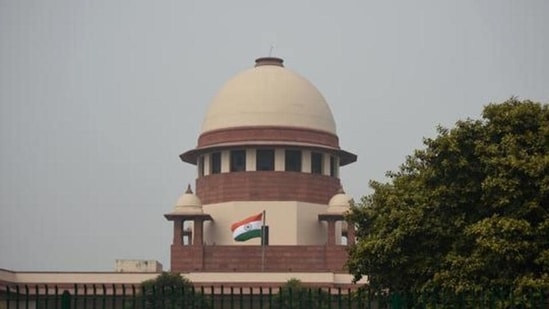SC posts petitions against Places of Worship Act before 3-judge bench
The law, which was introduced on July 11, 1991, maintained the “religious character” of all places of worship as it was in 1947, except the Ram Janmabhoomi-Babri Masjid dispute.
The Supreme Court on Thursday sought the Centre’s response within two weeks on a batch of petitions challenging the validity of the Places of Worship (Special Provisions) Act, 1991, and ordered that the matter be heard by a three-judge bench on October 11.

The law, which was introduced on July 11, 1991, maintained the “religious character” of all places of worship as it was in 1947, except the Ram Janmabhoomi-Babri Masjid dispute.
A bench headed by Chief Justice of India (CJI) Uday Umesh Lalit issued notice on two petitions and 15 applications, and held that a three-judge bench will be “eminently suitable” to decide on the validity of the law. Earlier, notices were issued on two other petitions.
The top court issued notices on petitions by Jamiat UIlama i-Hind and Vishwa Bhadra Pujari Purohit Mahasangh. In its plea, the Jamiat sought enforcement of the 1991 law. “Muslim places of worship are being made the subject matter of frivolous controversies and suits, which are patently barred under the 1991 Act,” it said.
The second petition, by Vishwa Bhadra Pujari Purohit Mahasangh, was filed in June 2020, challenges the law on the ground that it denies judicial review by preventing citizens from filing lawsuits to reclaim land belonging to temples that were destroyed by Muslim rulers.
Earlier, notices were issued on two petitions.
In his plea, Bharatiya Janata Party (BJP) leader and lawyer Ashwini Kumar Upadhyay alleged the 1991 law violated Article 25 (right to practice and propagate religion) and Article 26 (right to manage religious affairs) of the Constitution, besides being discriminatory by barring religious communities from approaching courts to restore their places of worship. He even questioned the Centre’s power to enact such legislation.
Upadhyay, on whose petition the top court issued a notice to the Centre on March 12 last year, had demanded that the matter be heard by a five-judge Constitution bench.
Trial courts in Mathura and Lucknow are considering suits by Hindus for worship at Shahi Idgah mosque in Mathura and Gyanvapi mosque in Varanasi, he informed the court on Friday. The Idgah in Mathura is next to the Sri Krishna Janmabhoomi Sthal, where some devotees believe Lord Krishna was born. Petitioners in the Gyanvapi case claim the mosque is part of the Kashi Vishwanath temple.
To the petitioner’s claim, the bench which also comprised justices S Ravindra Bhat and PS Narasimha, said: “We cannot stop the other courts.”
Appearing for the plaintiffs in Mathura and Lucknow, advocate Vishnu Shankar Jain said the judgment on the Varanasi suit is scheduled to be delivered on Monday.
Former Member of Parliament Subramanian Swamy, another petitioner in the matter, told the court that his plea seeks “reading down” of the 1991 law in a manner so that an exemption, similar to the one granted to Ram Janmabhoomi-Babri Masjid land, is made available to Kashi Vishwanath and Mathura temples.
Meanwhile, the Muslim side led by advocates Ejaz Maqbool for the Jamiat and MR Shamshad for All India Muslim Personal Law Board told the top court about their applications to intervene in the above petitions.
Maqbool, in his application, referred to passages in the Ayodhya title suit verdict that was delivered by a five-judge bench in November 2019. “The Places of Worship Act imposes a non-derogable obligation towards enforcing our commitment to secularism under the Indian Constitution. The law is, hence, a legislative instrument designed to protect the secular features of the Indian polity, which is one of the basic features of the Constitution,” the 2019 judgment said.
“The Places of Worship Act is thus a legislative intervention which preserves non-retrogression as an essential feature of our secular values,” it added.
Senior advocate Rakesh Dwivedi, who appeared for Upadhyay, said the comments noted in the Ayodhya judgment cannot be binding as it is “obiter dicta”, an opinion expressed by the judge while writing a verdict.
Dwivedi, however, did not object to Jamiat and AIMPLB applications to intervene in the present proceedings.
“Considering the nature of the controversy and the questions of law involved, we grant liberty to the applicants to intervene,” the bench said.
An application has also been filed by Kumari Krishna Priya of the Kashi royal family, claiming the 1991 law is discriminatory as it exempts Ram Janmabhoomi but not the Kashi Vishwanath temple.
The court issued notice on all petitions and applications and directed all parties to share copies of their petitions/applications. It also asked the Registry to place these matters before the appropriate three-judge bench on October 11.
Get Current Updates on India News, Lok Sabha election 2024 live, Election 2024 along with Latest News and Top Headlines from India and around the world.



